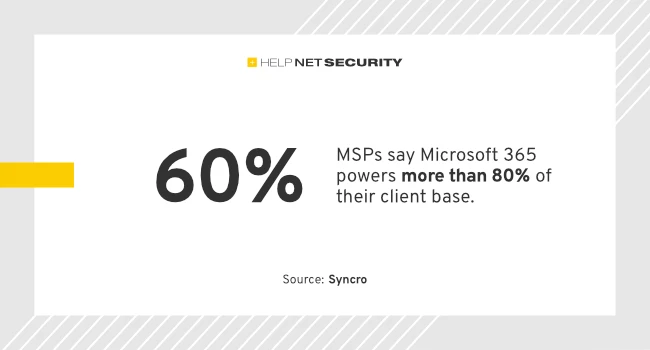Inside the messy reality of Microsoft 365 management
Most MSPs agree that Microsoft 365 is now the backbone of business operations, but a Syncro survey shows that complexity, incomplete backups, and reactive security continue to slow their progress in managing it.

About 60% of MSPs said Microsoft 365 powers more than 80% of their client base. This concentration has made Microsoft’s ecosystem central to service delivery, but it also exposes gaps in how MSPs manage data, identity, and security across multiple tenants.
Operational complexity and tooling gaps
Fragmented tools and manual workflows remain the biggest barriers to managing Microsoft 365. Many providers still switch between multiple dashboards, scripts, and consoles to enforce security policies across client environments.
This fragmentation leads to wasted effort and inconsistent security. Without unified management, enforcing standards across tenants becomes harder, and small mistakes can open the door to breaches or misconfigurations.
“Microsoft 365 is the backbone of business operations and MSPs are under enormous pressure to deliver protection that’s both effective and scalable. The findings show that MSPs are still grappling with fragmented tools and manual workflows that leave critical gaps in both data and identity protection,” said Michael George, CEO, Syncro.
Many respondents also cited the difficulty of maintaining consistent security baselines, limited visibility into identity risks, and a lack of automation for repetitive tasks. These issues show how scattered tools slow progress and create uneven protection.
Backup coverage and data loss
Backup continues to be one of the biggest areas of exposure for MSPs supporting Microsoft 365 customers. Nearly a third said they have experienced client data loss that could have been avoided with better backup coverage. The problem often stems from treating Microsoft 365 data and Entra ID identity settings as separate concerns.
When one fails, the other can become useless. A company may have intact files but no working accounts to access them, or restored user identities with no content behind them. The survey notes that resilience depends on protecting data and identity together.
Reactive security and slow baseline reviews
Many MSPs remain reactive in how they handle baseline security. About 28% said they review or update Microsoft 365 security baselines only after an incident. This pattern suggests that some still see baselines as a one-time setup rather than an active control that needs regular review.
Deploying baselines across many tenants takes time, and small businesses often resist changes that could disrupt users or require new licenses. These delays leave environments exposed longer than necessary.
Routine tasks such as patching, access reviews, and compliance checks also take up much of a technician’s schedule. Simplifying or automating those steps would help keep baselines current without adding more work.
Technician time and operational burden
Technicians spend much of their day on low-level security maintenance. Managing permissions, auditing for compliance, and responding to alerts consume most of their time, leaving little room for long-term improvement or threat planning.
Unifying tools and reducing manual work could free capacity for more proactive security. Many MSPs are looking for ways to centralize monitoring and configuration. Without that shift, they risk falling further behind as client environments grow more complex.
The shift toward proactive security
MSPs are expected to act as frontline defenders for the small and midsize businesses that depend on Microsoft 365. Yet many still operate with fragmented systems, limited automation, and reactive processes.
The findings are a reminder for business leaders to examine how their partners manage Microsoft 365 data, identity, and backups as one ecosystem. Microsoft secures the platform, but responsibility for the information and access within it lies with customers and their providers.
Building resilience will require simpler operations, reliable backups, and consistent baseline management. Until that happens, many MSPs will remain vulnerable to the same complexity they are trying to control.